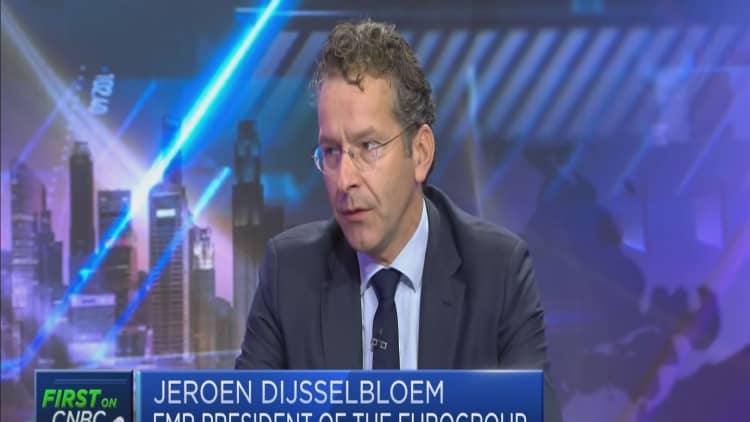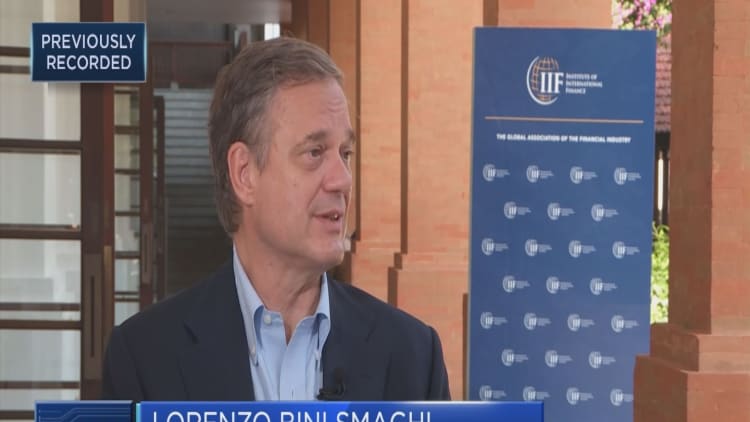
An Italian crisis would be an "implosion" and have severe consequences for the country's banking system, the former chief of the Eurogroup told CNBC Friday.
Financial markets have fretted about Italy's 2019 budget, amid new plans to increase public spending. There are strong concerns that such fiscal plan will derail the reduction of the country's debt pile — which is the second largest in the euro zone, totaling 2.3 trillion euros ($2.6 trillion).
Speaking with CNBC on Friday, Jeroen Dijsselbloem, the previous head of the group that brings together the 19 euro zone finance ministers, told CNBC that if Italy were to turn into a crisis mode, it would be an "implosion," given the way that its economy is organized.
"If the Italian crisis becomes a major crisis, it will mainly implode into the Italian economy ... as opposed to spreading around Europe," he said. "Because of the way that the Italian economy and the Italian banks are financed, it's going to be an implosion rather than an explosion."
The Italian government and the European Commission have been embroiled in a battle of words for the last couple of weeks over the new spending plans. On Thursday, the Brussels-based institution sent a letter to the Italian finance minister, Giovanni Tria, warning him that the 2019 budget draft seemed to point to a "particularly serious non-compliance with the budgetary policy obligations laid down" in European rules.
The problem in the commission's eyes is not so much the headline deficit of 2.4 percent of gross domestic product, which is actually below the EU's 3 percent threshold. The more worrisome figure for that office is the structural deficit. The new spending targets point to a structural deterioration of 0.8 percent of GDP in 2019. In contrast, Italy had committed last April to improve its structural deficit by 0.6 percent of GDP next year.
The anti-establishment government in Italy is aiming to support the economy by setting a financial buffer for investments. However, some analysts have raised concerns that the government's growth forecasts are too optimistic and the extra spending could derail the reduction of public debt.
The Italian government has until Monday to reply to the commission's latest letter. If from that response, the commission still believes that the budget is in serious non-compliance, it has two weeks to adopt an opinion and request a new draft budget within three weeks.
Dijsselbloem predicted that a confrontation was incoming.
"Looking at what (Italian officials) have put on the table, the commission really has no option than to send it back, which — by the way — is not the end of the process, but the start of the process," he said.
In the end, Dijsselbloem projected, there won't be any bailout for Italy because "politically and financially it won't happen.
"I don't see support around the euro zone to say, 'These guys are completely off track — let's help them,'" he said, adding that a bailout of Italy would also "wipe out" the European Stability Mechanism fund within two years.
"And then where are we? Two years would not be enough to sort this out," the former Eurogroup president said. "Italy needs to save itself."
Still, he acknowledged that the whole situation was cause for concern.
"It's pretty worrisome, there's going to be confrontation and I think the commission has no choice then to accept that confrontation and to take it," he said, adding that banking authorities will have to examine "what this does to the Italian banks."
However, Dijsselbloem, who was at the eye of the storm during the Greek crisis a few years ago, said the ongoing tensions around Italy are fundamentally different: "It's very different and we're in a different era."

"The Greek crisis had the huge risk that it would contaminate the rest of the euro zone and create a lot of scare around the euro zone and the euro zone banking system," he said, explaining that Italy, on the other hand, "finances itself to the large extent."
The yield on the 10-year Italian bond returned on Friday morning to levels not seen since 2014, hitting 3.73 percent as the dispute with Brussels intensified.
Valentin Marinov, head of G-10 forex strategy at Credit Agricole, told CNBC earlier this month: "Things to worry about is the fact that BTP yields have gotten very close to the 3.5-4 percent, which according to our own colleagues on the rate side could push us in a snowball territory whereby the debt could start growing so rapidly."
Correction: This article has been updated to reflect that the EU has a 3 percent threshold for countries' deficits compared to their GDPs.



